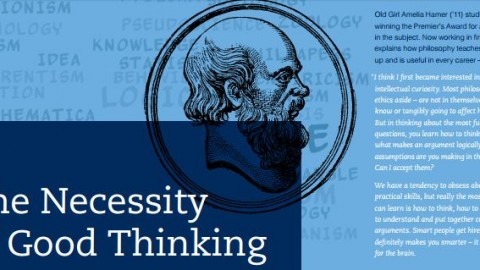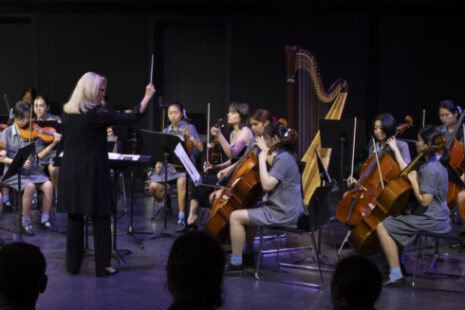The Necessity of Good Thinking

When people think of a Philosophy class, images of ancient, bearded Greek men in togas or chain-smoking French intellectuals in berets and black skivvies may come to mind. For many, it fails the utility criteria a post-industrial society automatically defers to when determining the value or relevance of a school subject, which is, ‘what job will this lead on to?’
The answer, in short, is all jobs, as the etymology of the word ‘philosophy’ which means ‘love of wisdom’, suggests. It is vocational in the widest sense of the word, in that it assists students in negotiating the complexities of modern life by compelling them to take charge of their own thoughts. Ironically, as the world’s oldest discipline, it is the one least bound by tradition or regulation. Its only demand is clarity of thought and adherence to the authority of reason, which makes it a crucial inclusion to any school that claims to produce critical thinkers and offer a genuinely liberal education.
St Catherine’s School is one of only 88 in the State offering Philosophy at VCE level. Of this 88 there are barely a handful of independent girls’ schools. The first introduction for our girls begins in Year 5, where Junior School Principal Mrs Alana Moor guides the students through a range of ethical questions, easing them into the art of careful opinion forming and the consideration of different moral views.
In the Senior School, students have the chance to take Philosophy as part of the Years 9 and 10 Elective program. The first few weeks on critical thinking is followed by Units on ethical theory and political philosophy, which for many students, is the first opportunity they have had to question and evaluate their accepted beliefs and assumptions.
This Years 9 and 10 taster sets the stage for VCE Philosophy, where students take the step into formal logic, metaphysics and more challenging questions of ethics and politics. In the classroom above the Year 12 Common Room (suitably nicknamed ‘Heaven’ by Ms Gunn) blue ribbons stand in for togas, although the communal table and rigorous discussions evoke ancient times. On a typical day, an idea is laid on the table and unpacked. Arguments are never dismissed or blindly accepted, but evaluated logically. In Year 12, students spend the year in the company of Descartes, Plato, Locke, Nietzsche and Peter Singer amongst others, considering the value of their arguments in relation to our contemporary context. The course truly operates in the present, demanding an examination of modern life through the lens of ancient wisdom. Thus, Cartesian dualism is tested against the findings of modern neuroscience, while the implications of John Locke’s harm principle are considered in relation to online liberty.
The result is a genuinely collaborative and highly stimulating learning experience where the students carry the majority of the intellectual load, using online forums to share their evaluative points and test out ideas. This conflation of old and new is very much in the spirit of the subject, which is designed to be a tool kit for modern life. So, please come up to Heaven and see the spirit of Socrates alive and well.
Old Girl Amelia Hamer (’11) studied philosophy in VCE, winning the Premier’s Award for academic excellence in the subject. Now working in finance in London, she explains how philosophy teaches you from the bottom up and is useful in every career – “I think I first became interested in Philosophy out of intellectual curiosity. Most philosophical questions – ethics aside – are not in themselves useful things to know or tangibly going to affect how you live your life. But in thinking about the most fundamental philosophical questions, you learn how to think from the bottom up: what makes an argument logically sound? What assumptions are you making in that statement? Can I accept them? We have a tendency to obsess about vocational and practical skills, but really the most useful thing you can learn is how to think, how to question and how to understand and put together complex and coherent arguments. Smart people get hired, and philosophy definitely makes you smarter – it is like a workout for the brain.”




